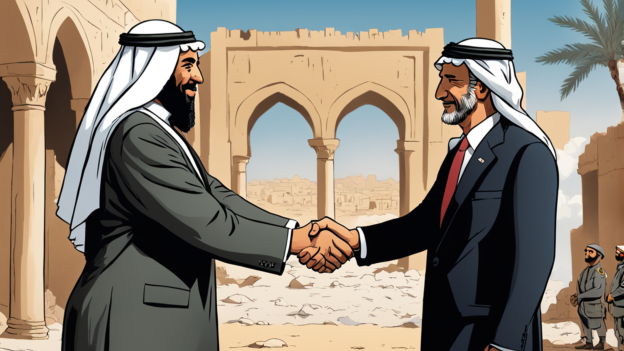In the latest episode of “As the Middle East Turns,” Israel and Hamas have found themselves in yet another ceasefire—because, apparently, even century-old conflicts need a breather every now and then. This ceasefire, brokered by none other than the United States, has everyone asking: Is this a genuine pause in the fighting, or just a chance for both sides to reload?
Let’s set the scene: Gaza is in shambles, Israel is on edge, and somewhere in a secure bunker, diplomats are doing their best impression of marriage counselors for two parties that really, really don’t want to be in the same room. But hey, everyone knows that nothing brings people together like a good old-fashioned American intervention.
The ceasefire, which has been described by some as a “fragile agreement” and by others as “just another Tuesday,” comes after days of intense fighting that left international observers doing their usual routine: shaking their heads, issuing stern statements, and wondering why anyone thought this time would be any different.
Of course, the U.S. has stepped in with all the enthusiasm of a substitute teacher trying to maintain order in a classroom of unruly kids. “Now, now, let’s all put down our rockets and talk about our feelings,” said a U.S. official, probably. The ceasefire is meant to give both sides time to cool off, although the smart money is on everyone using the time to gear up for the next round.
Israel, for its part, has agreed to the ceasefire with the kind of enthusiasm one might expect from someone reluctantly handing over the TV remote. Meanwhile, Hamas has agreed with a wink and a nudge, as if to say, “Sure, we’ll stop—for now.”
The international community, ever the optimists, are cautiously hopeful that this ceasefire will hold, much like they were cautiously hopeful the last dozen ceasefires would hold. Spoiler alert: They didn’t.
On the ground, the ceasefire means a temporary halt to the kind of chaos that has become tragically routine. For the people of Gaza and Israel, it’s a welcome reprieve, though no one is under any illusions that peace is suddenly on the horizon. After all, in a region where “permanent” seems to apply only to the cycle of conflict, “ceasefire” might as well be code for “let’s take a quick break.”
Meanwhile, world leaders are busy congratulating themselves on a job well done, because nothing says “diplomatic victory” like getting two sides to agree to stop shooting at each other for a few days. They’ll likely spend the next week or so issuing statements about how important it is to seize this opportunity for peace, while quietly ignoring the fact that these opportunities seem to come around more often than a bad penny.
In the end, this ceasefire might last, or it might not. But one thing’s for sure: the Middle East conflict will continue to be the world’s longest-running drama, with plenty of plot twists, cliffhangers, and, unfortunately, reruns. So, stay tuned, because the next episode is probably already in the works.


Leave a Reply